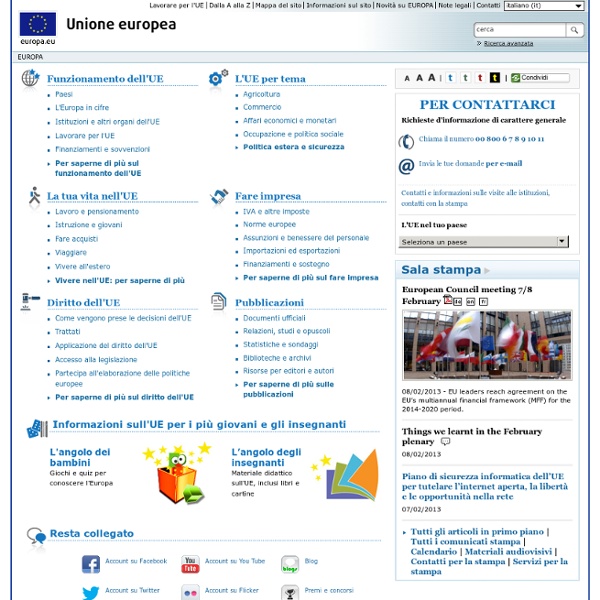



Development and Cooperation - EuropeAid European Commission decides to create a Support Group for UkraineThis Support Group will provide a focal point, structure, overview and guidance for the Commission's work to support Ukraine. More Mobile laboratory funded by EuropeAid to fight Ebola outbreak in GuineaAs part of the international response to the current Ebola outbreak in Guinea, WHO and its Global Outbreak Alert and Response Network (GOARN) have requested lab experts of the European Mobile Lab (EMLab) project to support the Ministry of Health of Guinea. Read more EU-Africa Summit - Nutrition side eventEU, World Food Programme and UNICEF address issue of malnutrition in Niger during EU-Africa Summit side event. Read the joint article European Year for Development 2015 - Parliament vote“I am delighted that the initiative to organise a European Year for Development in 2015 has received widespread inter-institutional support, as shown by yesterday's vote in the European Parliament."
Bandi aperti europafacile.net Cos'è Europafacile Autore del sito Credits Contattaci Aggiungi ai preferiti Faq L'UE online Progetti Ricerca Partner Spazio Twinning Registrazione Recupero password Newsletter Consultazioni dell'UE Erlai First Spazio Europa Risultato della ricerca - Agenda Bandi Programma per l`apprendimento permanente - Bando generale 2013 Aperto Attori non Statali e autorità locali nello sviluppo - Bandi 2013 per Paese **Aggiornati 08/02/2013** DCI 2007-2013 - Attori non statali e autorità locali Sicurezza alimentare - Bandi 2013 per Paese **Aggiornati 08/02/2013** DCI 2007-2013 - Sicurezza alimentare EIDHR - Bandi 2013 per Paese **Aggiornati 08/02/2013** Strumento per la democrazia e i diritti umani 2007-2013 LIFE+: imminente la pubblicazione del bando 2013 7° programma quadro di RST - Bandi 2013 programmi specifici `Idee`, `Persone`, `Capacità` PROGRESS - Bando per progetti sulla sperimentazione sociale Fondo europeo per i rimpatri - Bando 2012 per Azioni comunitarie Partenariato UE per la pace - Bando 2013 Salute 2008-2013
Città di transizione Da Wikipedia, l'enciclopedia libera. Le città di transizione (Transition Towns in inglese) rappresentano un movimento fondato in Irlanda a Kinsale e in Inghilterra a Totnes dall'ambientalista Rob Hopkins negli anni 2005 e 2006. L'obiettivo del progetto è di preparare le comunità ad affrontare la doppia sfida costituita dal sommarsi del riscaldamento globale e del picco del petrolio.[1] Il movimento è attualmente in rapida crescita e conta centinaia di comunità affiliate in diversi paesi.[2] Storia[modifica | modifica sorgente] Il concetto di transizione matura dal lavoro fatto da Rob Hopkins (esperto di permacultura) assieme agli studenti del Kinsale Further Education College, culminato in un saggio dal titolo Energy Descent Action Plan. Questo tratta di approcci multidisciplinari e creativi riguardo a produzione di energia, salute, educazione, economia e agricoltura, sotto forma di "road map" verso un futuro sostenibile per la Città. Futuro del progetto[modifica | modifica sorgente]
Transition Italia | Nodo italiano della rete internazionale di Transizione Programmi e bandi. 2014/2020 eForms: Documents to download, support and notices Published eForms Please find here the latest versions of the on-line application forms - "eForms" - that are currently published. These eForms are linked to specific Calls and Programme Guides. If the version of the eForm posted here is newer than one you previously downloaded, please visit the Call webpage or Programme Guide webpage for the programme/action concerned to find an information bulletin on why the new version was released. This will include details of any problems identified, their impact and advice on how to proceed. PLEASE NOTE! In case you encounter an "Error message 26 – failure to submit": this may be related to Adobe settings. You can also and receive updates in real time . Test eForm: This form contains a small number of questions and functions. This Test eForm is suitable for applicants of any programme. Known Issues Submission unsuccessful due to a 'Network Error' Network error during submission Submission successful but submission number not recorded in your form